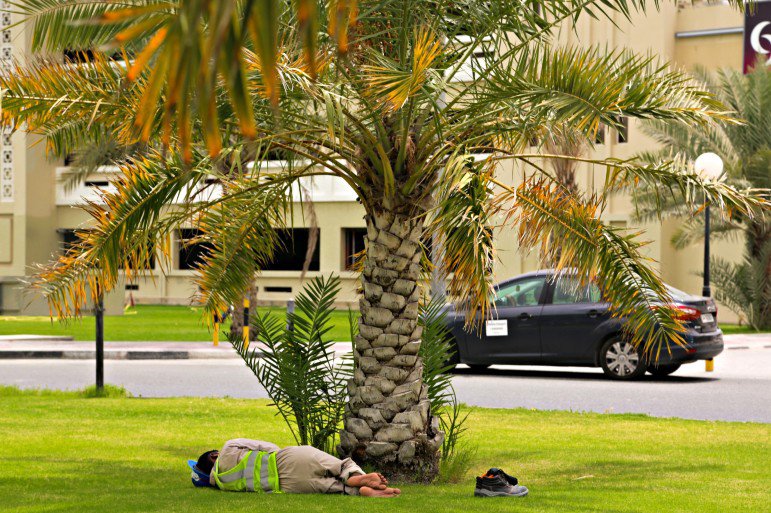Ten Reasons Qatar 2022 is a Horrible Idea

As part of my travel-less 2015, I'm working on putting my photos from Egypt, Brazil, and Argentina into albums. Back in the day, I'd get home from a big trip, immediately take my twenty rolls of film to be processed, and pick out the perfect album or scrapbook for the job. Now? I upload all my pictures to my computer, edit them in Photoshop, and post them to Facebook and this blog. And while I love being able to share with friends online, I miss having that hard copy that will survive the zombie apocalypse. So, that's what I'm doing.
I'm about halfway done with my Brazil album, and I'm smiling just looking at the pictures of the USA vs Belgium game in Salvador. I'm so, so glad I went to this World Cup, especially given all the signals FIFA has put out this week that they'll be shifting the 2022 World Cup back by five months. It's a train wreck, and at this point, it's hard to tell if they'll pull it off, or if FIFA will end up collateral damage in its own epic mess.
The fact that Qatar is not an ideal place to hold a World Cup isn't news. John Oliver did an amazing segment on 'Last Week Tonight' that covers most of the salient points. But ignoring the issues like money and bribery and the fact Qatar's team would never make it to a World Cup without paying to play, here are ten reasons why the 2022 World Cup looks like it's going to be a mess...

1. It's Too Damn Hot
Originally, Qatar hoped to install cooling technology in all their brand new stadiums, with artificial clouds being discussed as if they were an actual possibility. Once it became clear that Marty McFly wasn't going to magically appear with the plans in 2015, moving the World Cup back by about five months was the only option. Training facilities and fan areas will also be cooler then, with temps dropping from an average high of 105°F in June and July down to 80° in November and December. This is still pretty damn hot, but not out of the realm of reason. Temperatures during the '94 World Cup in the US hit the 90°s on a regular basis. This past summer, thanks in large part to a Brazilian court mandate, the ref paused the USA vs Portugal game in Manaus for a water break. The temperature was 84° with 70% humidity. Sustained heat can be a serious health risk, both to fans and players, whose bodies are already under stress.

2. People Are Dying
At the present rate, 4,000 construction workers are estimated to die working on World Cup-related infrastructure in Qatar. (Compare this to eight construction-related deaths in Brazil.) This sounds horrific enough already, but the worst part is, saying "construction workers" is skirting the truth. Modern Qatar has been built by migrant workers from India, Nepal, and many other Asian countries. Often, once these workers arrive, their passports are confiscated and they cannot leave without their employer's permission. They are forced to live in horrible conditions, work in sweltering heat (sometimes without water), and are paid a pittance... if anything.
3. Culture Clash
This point seems especially trifling in comparison to the last one, but here it is: drinking is largely illegal in Qatar. Lots of people are worried beer won't be sold in stadiums. While I'm sure it will - I think FIFA cares far more about their sponsorship deals than thousands of workers' deaths - it's the overall spirit of the World Cup that will take a blow. While the party takes on the flavor of each host country, I can't imagine drinking outside strictly designated areas will be allowed, or women in bikinis, or dudes in tights.
Being gay is also illegal in Qatar. Though FIFA runs campaigns every year decrying homophobia in the sport, it's a pretty damn empty gesture when the head of the organization hand-waves any questions about Qatar's laws by saying gay fans should simply "refrain from any sexual activities" while attending the tournament.

4. White Elephants Return to the Arabian Peninsula
Qatar currently has three stadiums, all of which need to be expanded by about 20,000 seats for a World Cup. They plan on building five to nine more. The city where the final is going to be held? It doesn't exist yet. All this work, plus the infrastructure to support it, is going to cost about $200 billion. To put that in perspective, that's four times more than it cost Russia to pull off the Sochi Olympics. Those riots in Brazil over excessive spending? Brazil spent $14 billion. South Africa, just $3.5. Money aside, it's a colossal waste for a tournament that lasts all of a month. Qatar is only 4,500 square miles, the same size as New York's metro area. All but one to two of those stadiums will end up, as John Oliver eloquently put it, as the world's largest bird toilets.

5. Lack of Accommodations
Recently, attendance per World Cup has clocked in around 3 million. Of that number, about 1 million attendees have been foreign fans. Even Brazil had issues providing enough hotels in certain host cities. Meanwhile, Qatar has about 110 hotels, of which at least 80% are 4 or 5 star. They're planning to build an additional 21 by 2017, 100% of which will be four or five star. (Reserve one of the country's 36 hostel beds today!) Why does Qatar have so few hotels? The country has a population of 2.2 million, but only about 225,000 of these people are citizens. The rest are migrant workers. Maybe FIFA plans to reimburse them for their troubles with tickets.
To be fair, plenty of people will fly in from surrounding countries for the day to catch a match. And for those who do come from farther away, there will be no need to change hotels for the duration of the tournament, given Qatar's tiny size. The best idea I've heard to remedy the hotel shortage is allowing cruise ships to dock nearby - which would be brilliant, but like everything else associated with Qatar, ridiculously expensive.

6. Screwing Other Leagues and Confederations
On the subject of money... while the World Cup is wonderful, and magical, and great, it only happens once every four years. A professional soccer player spends the majority of his time and makes the majority of his money with a club team rather than his national team. In Europe (where 19 out of 20 of the world's most valuable clubs are located), the season runs between late August and early May, with one or two matches per week. On top of this, the biggest teams are involved in other tournaments as well - usually a national cup competition, the Champions/Europa League, and sometimes an international club cup as well. (This is why it's hard to win consecutive or multiple titles - I've watched my team win their national cup and then go on to play like they're still half-drunk from the celebrations a few days later.)
The point of this is, the schedule is already a hectic but finely-tuned machine, with billions of dollars of revenue at stake. The new calender could affect two to three seasons of club play. FIFA is basically telling Europe's leagues they need to redo everything to accommodate the 2022 winter World Cup, and giving them zero incentive to do so.
And it's not just "big" Europe that suffers. The African Cup of Nations is generally held in January and will have to be rescheduled so it doesn't fall a month after the World Cup. FIFA was all like, "Oh, yes, they've agreed to push it back to the summer!" Meanwhile, the sports minister of Guinea (where the competition will be held), shot back that they'd agreed to no such thing - seeing as summer is monsoon season in West Africa.

7. Greater Risk of Injury
The heat mentioned in point one, plus the crazy schedule we just discussed, could lead to disaster for more players than usual. World Cup years are always bad for injury - Kaka played through injury for Brazil in 2010 and never really recovered. And while players are eager to represent their country in a World Cup, there are a lot more international games in the lead-up to one as well. Which the clubs hate. It's not unusual to have a player go off to a meaningless friendly with his national team, and return with an injury that takes weeks to recover. Meanwhile, his club team is losing money as the player sits in the stands. On occasion, clubs have been rumored to instruct players to fake injury to get out of national team friendlies just so this doesn't happen.

8. ESPN and FOX Get Screwed Too
Just when ESPN had finally seemed to figure out how to do a solid World Cup broadcast, FOX outbid them for the next two tournaments. (This music? You won't be hearing it for a while.) Anyone who has suffered through soccer on FOX knows they have a long way to go before they can catch up with ESPN. However, FOX has time to work on their presentation... especially now that FIFA has given them the 2026 rights as well. Key words - given them. There was no bidding process, probably because FIFA screwed FOX over with the new 2022 dates and therefore had to make it up to them in some way.

9. Will Casual Fans Bother?
Before every World Cup, the inevitable articles start popping up - will this be the World Cup that makes America a soccer nation?! These articles are dumb, as America will never be a soccer nation in the way Brazil or England is. We've got too much going on to commit to a single sport. That's not to say that we don't love soccer - USA '94 still holds the record for highest attendance at 3.6 million, despite having twelve less games than every World Cup since. Americans were the second-largest group of fans (after Argentina) to come to Brazil, buying almost 200,000 tickets. In addition, we have our own domestic league (MLS) and it's easier than ever to follow teams around the world thanks to
However, we all know those casual fans - the ones who only care about soccer once every four years. Typically, they're big sports fans, and let's be honest, the summer is a little sparse for those guys and girls. Will they exhibit the same level of enthusiasm when soccer is competing with the NFL, NBA, NHL, and college football, during what is possibly the busiest month of the year, and just before the winter Olympics?

10. There Will Be No Dress Rehearsal
Prior to the last few World Cups, an international tournament called the Confederations Cup has been held in the host country. It's a smaller tournament, a kind of warm-up for the main event. It calmed fears in South Africa in 2009, and reignited them amidst riots in Brazil in 2013. Since Qatar clearly can't host in the summer, and since FIFA can't compel clubs to mess up their calendars two years running, the Confederations Cup will be held somewhere else in Asia. So basically, we'll have no idea if Qatar is ready in 2022 until the teams arrive.

FIFA's own risk analysis of two of the 2022 bids.
So, there's that. The hilarious thing is, Qatar is so ridiculous that hardly anyone is talking about Russia hosting in 2018. To be fair, Russia's issues are more in line with what we expect from the World Cup or the Olympics. (I mean, once you've allowed Italy under Mussolini and Germany under Hitler to host, it's kinda hard to top that politically...) They have problems with racist Ultras (hardcore fan groups) and their own criminalization of homosexuality, but next to Qatar, they look like an amazing choice.
Does my indifference to Russia hosting make me a sore loser, upset only because my own country's bid for 2022 failed? While I'd love to see another World Cup in the USA in the next twenty years, 2022 probably should have been held in Australia, who also bid to host the tournament. Australia is a country that's never hosted a World Cup but already has the infrastructure in place and would be yet another amazing party. However, Australia would need a bit of time to get World Cup-ready. Other choices closer to the Middle East would be Turkey, or hell, even Iran or Egypt, if either could get its act together. FIFA seems eager to have China host one of these days, and Japan or South Korea would be happy to have another chance after co-hosting the tournament in 2002. And I'd be happy to see it in almost any of those places.
Regardless of what they say, FIFA knows the United States could put on a World Cup faster than almost any other nation in the world. We're the unspoken backup plan. We've done it once before on a smaller scale, when the 2003 Women's World Cup was moved from China because of SARS. And a move isn't unprecedented for the Men's World Cup either - with three years to prepare, Mexico took over for Colombia (who bowed out on their own) in 1986. While journalists seem to think FIFA will award the United States the 2026 World Cup, bumping us to 2022 would allow them to give China the 2030 tournament.
I'm not 100% certain FIFA will survive to see its centennial in 2030. If Sepp Blatter leaves his post as president before 2020, and it appears Qatar will not be ready or other 'irregularities' are found, FIFA could have a scapegoat and a reason to move the 2022 Cup. (I'm shocked, shocked to find that gambling is going on in here!) But I doubt they will - most of the higher-ups seem to be in Qatar's pocket as well and FIFA in its present form is too insular for an outsider to come in and reform everything. And while I don't care about FIFA as an organization, the loss of the present World Cup tournament would be a tragedy. Certainly, some new group would be formed to pick it up, but it would probably mean we'd miss a tournament or two, and an entire generation of players would have their dreams dashed, much like what happened in the 1940s.
On the other hand, like so many other "doomed" World Cups before it, Qatar 2022 may come off without a hitch. I'm honestly not sure if this isn't what we're all afraid of - a smooth tournament that would justify FIFA's new practice of selling to the highest bidder and disregarding the rights of everyone else, from the large and powerful conglomerates that run the sport, to the hundreds of millions of people who love the game, no matter who is running the show.


Comments
Post a Comment